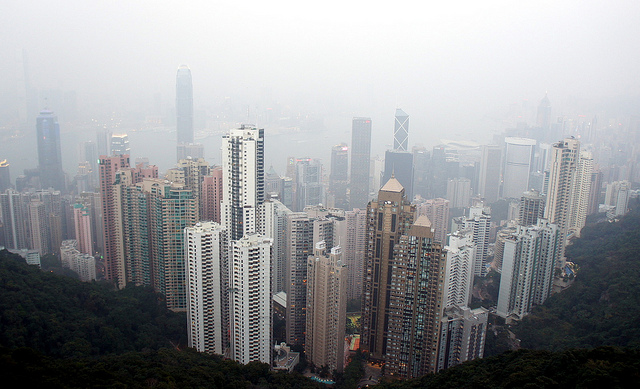Hong Kong pro-democracy leaders Anson Chan and Martin Lee spoke last week about Hong Kong’s democratic development at two public forums in Toronto. The democracy heavyweights travelled to Canada and the U.S. to rally international support for Hong Kong people’s fight for genuine democracy.
On Monday, April 7, over 300 attended the talk “One Country Two Systems Under Threat” hosted by Canada-Hong Kong Link. Another talk “Hong Kong’s Democratic Future” was held by Asia Pacific Foundation of Canada on Wednesday. Chan and Lee discussed Hong Kong’s current political crisis and democratic development.
After visiting Toronto, Chan and Lee met with New Democratic Party Leaders Thomas Mulcair and MPs Laurin Liu, Don Davies, Fin Donnelly and Craig Scott as well as Minister of Employment and Social Development Jason Kenney in Ottawa to discuss Hong Kong’s democratic development.
Urgent cry for democracy
Lee, founding chairman of the Democratic Party of Hong Kong, expressed concern over the implementation of “Chinese-style” elections in 2017, despite Beijing’s promise that all citizens will be allowed to vote. “Even if you have a one-person one-vote system, it is still not a real election because the candidates are selected by the Chinese government,” said Lee.
Beijing has explicitly stated that it will not allow candidates who “confront” the Chinese government to stand for election. Beijing loyalists are seeking to control the 2017 election through the nomination process. Last month, Rao Geping, a member of the Basic Law (Hong Kong’s mini-constitution) Committee and a law professor at Peking University, openly rejected any public nomination of Hong Kong’s next leader.
According to the Universal Declaration of Human Rights and Hong Kong Basic Law, Hong Kong people have the right to participate in free and fair elections.
“However, China does not want to give the power to Hong Kong people and has instead tightened its grip on Hong Kong,” said Lee.
Lee cited Beijing officials’ earlier calls for more “cooperation” between executive, legislature and judiciary, despite the Basic Law’s stipulation that Hong Kong exercises separation of these powers. “This is a critical moment for our justice system,” said Lee.
“Without genuine universal suffrage, our legal system will continue to erode. Even judicial independence would not be sufficient to protect human rights and freedoms of speech, assembly and religion, because the legal system itself would no longer be just.”
Chan, former chief secretary and convener of pro-democracy group Hong Kong 2020, added that if China rejects Hong Kong people’s demand for democracy, the city would become highly unstable, posing serious challenges to governance.
‘International pressure matters’
When asked if there is hope, Chan said that people are the biggest bargaining chip. “China is watching closely. The central government has not made up its mind on Hong Kong’s constitutional reforms, which means that it is not set in stone yet and Hong Kong people must stand up for their future.”
Chan said that pressure from the international community is crucial because China cares about its international image.
“Every voice in support of democracy in Hong Kong matters,” said Chan.
Beijing’s anxiousness is shown in its reaction after Chan and Lee met with U.S. Vice President Joe Biden last week. In response to a White House statement in support of Hong Kong’s democracy and self-autonomy, Beijing’s Foreign Ministry representative in Hong Kong accused the U.S. of interfering in the city’s internal affairs. He further commented that Hong Kong residents “are enjoying unprecedented democratic rights and freedom, which has won international acclaim.” Pro-Beijing media call the democracy champions for conspiring with foreign powers.
Chan said that she expected criticisms from China. “Basically this is double standard. After the handover, the Chinese government encouraged people to travel abroad and convince foreign investors that China will keep the ‘One country, two systems’ promise, yet no one called it ‘conspiring with foreign powers’ back then.”
She believes Hong Kong’s democratic future matters to the international community. “Many foreign investors and expatriates care about whether Hong Kong can maintain an independent judiciary and fulfill its treaty obligations with other countries. After all, Hong Kong’s biggest strength is its legal system that protects human rights and ensures fair and open competition, but we are losing it.”
Conservative MP Bernard Trottier also spoke in the House of Commons in defence of democratic freedoms in Hong Kong. He calls for “the spirit and letter of the Basic Law to be respected” so that Hong Kong people can “freely elect their chief executive in 2017 and have a legislature elected by universal suffrage in 2020.”
Hong Kong’s democratic future remains unclear. As the 2017 election nears, both Beijing loyalists and pro-democracy advocates are doing all they can to influence the outcome. Occupy Central, a pro-democracy civil disobedience movement that Beijing watches nervously, threatens to block the city’s central business district if Beijing rejects a citizen-backed proposal that satisfies international standards. The group has organized many deliberations in preparation for a referendum it is hosting this June.
Meanwhile, Chan and Lee continue to play their part in rallying international support. After Toronto and Ottawa, the two advocates spoke with the public in Vancouver. They ended their North America tour last weekend and will be travelling to Europe.
Ellie Ng is a recent graduate of Middlebury College, where she majored in International and Global Studies. Based in Hong Kong, she observes and sometimes takes part in protests while pondering questions big and small about social change.
image: flickr/David Leo Vekster



